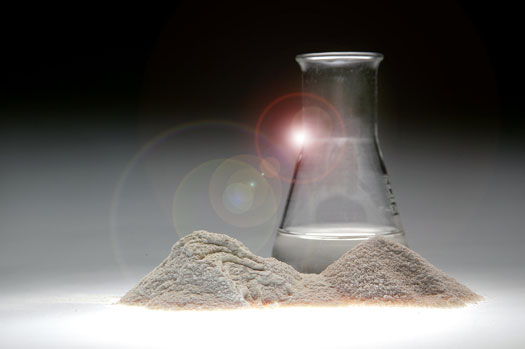Hydraulic fluid based on sustainable raw materials


The increasing awareness of the political world and society about environmental issues and sustainability is leading to changes in the way many companies think and strong focus being put on the development of eco-friendly, biodegradable products. The mineral oil based hydraulic fluids widely used today have several serious shortcomings. The main issue is environmental pollution caused by unavoidable losses and system damage. In addition these fluids are a high fire risk, lead to unsafe and dirty working conditions, and their purchase and disposal are costly. There is a particular high risk for the environment with mobile hydraulic systems (forestry and agriculture, construction, shipping) due to the high operating pressure, extensive pipe network, and large quantities of fluid.
Water as an environmentally-friendly hydraulic fluid medium
Water based hydraulic systems preceded mineral oil systems. Indeed, at the start of the 20th century all hydraulic systems used pure water as the pressure medium. Water is cheap compared to oil as a hydraulic fluid and is also eco-friendly, non-flammable, readily available, and can be disposed of easily. However, pure water has severe limitations due to its low viscosity, poor lubricating properties, and corrosiveness and that is why mineral oils are preferred in many areas of technology.
Biopolymers as thickening agents
Within the framework of the BioHydra project, the Fraunhofer IVV will develop a novel hydraulic fluid having a water fraction of at least 90%. The viscosity and lubrication properties of the fluid are realized by adding carbohydrate based biopolymers recovered entirely from sustainable raw materials. The modified carbohydrates provide thickening and microbiological stability and so are very suitable for the development of alternative hydraulic fluids. The project will start by screening various water-based biopolymer solutions for their thermal and physical stability, tribological properties, and long-term stability.
Plant corrosion protection additives for a biobased hydraulic fluid
The second stage involves development of an additive based on plant extracts of differing origin. As the hydraulic medium consists mostly of water, corrosion protection is a priority for the development work. The plant extracts that are being studied to replace conventional corrosion protection additives are mostly secondary plant substances (SPSs) having high anti-corrosion effect due to their chemical structure. The development of the additives involves several steps including identification of effevtive substances in the groups of substances, determination of interactions between additives and the biopolymers, stabilization of the plant extracts in the hydraulic fluid, and measurement of the service life under practical conditions. The Fraunhofer IVV has extensive know-how and longstanding experience developing polymer-based lubricants and recovering and using secondary plant substances from a variety of raw materials. The institute received the German Raw Material Efficiency Award and the Joseph von Fraunhofer Prize 2012 for developing a polymer-based cooling lubricant. Our experience with secondary plant metabolites and developing lubricants is an ideal platform for participation in the BioHydra project.
Project term: |
2016 to 2019 |
Project management |
Fachagentur für nachwachsende Rohstoffe e. V. |
 Fraunhofer Institute for Process Engineering and Packaging IVV
Fraunhofer Institute for Process Engineering and Packaging IVV